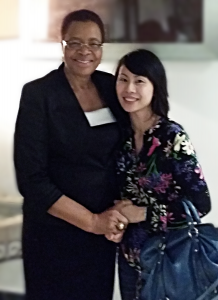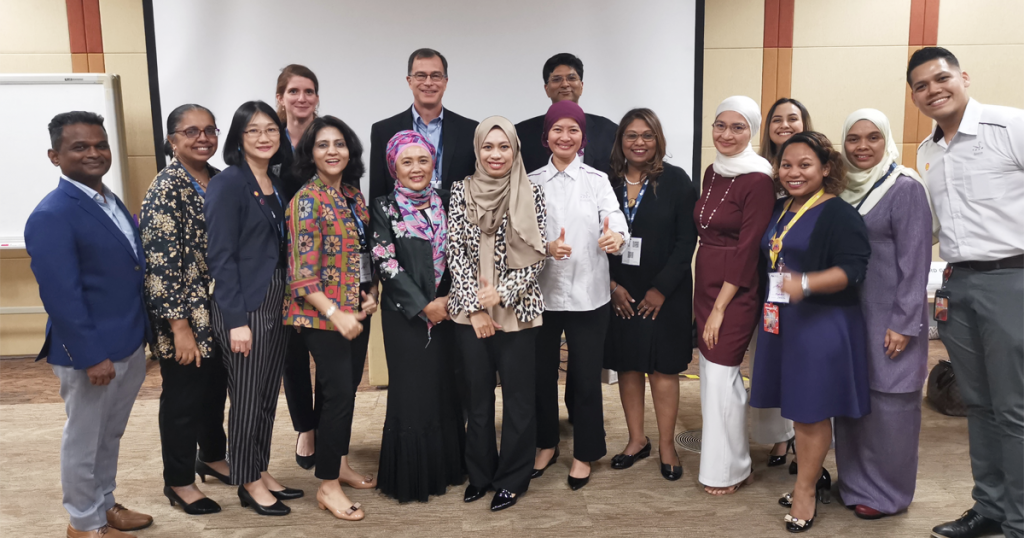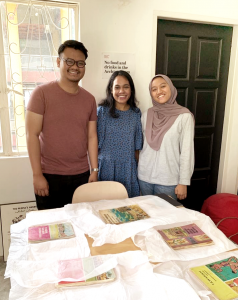In the past few years, the world has seen the growth of many movements that champion gender equality and diversity, both inside and outside of the workplace. Despite these efforts by advocacy groups, a recent report shows that women remain underrepresented at every level in the office; making up less than 50% of the workforce [1]. In addition to this, some industries, including consulting, remain heavily skewed towards men.
In response to the trend, we talked to three consultants in PEMANDU Associates to have them share their experiences in the male-dominated industry. What stood out from their reflections is their mutual agreement in the importance of building and extending support systems in order for women to empower each other.
Cheryl Lim, Executive Vice President & Partner
Cheryl has been in consulting for the most part of her career. Throughout her past ten years with PEMANDU Associates, whilst rising to the ranks of Executive Vice President & Partner, she also became a mother.
Based on her own experience, Cheryl observes that the field offers equal opportunities to both women and men. She explained, “Consultants are selected for projects predominantly on the basis of their expertise and their contribution to the expected outcomes. It’s a case of the best person for the job.”

There are, however, different roles that women and men play in various phases of life, and at times, expectations towards both genders vary in this respect. Having said that, one changing trend that she noticed in the workplace is that employers today are making more conscious efforts to acknowledge that people have other responsibilities outside of the workplace. “I can see that among the leadership team, we are making an effort to appreciate and accommodate personal needs where possible, without putting work at risk. Everyone brings a different perspective to the table, and work outcomes benefit from this diversity.” Accommodating personal needs has also resulted in staff going the extra mile to get the job done.
Within the office confines, Cheryl pushes for women to be more proactive to find the support that they need, and this was, she believes, to be a key factor in the growth of her career. She sees value in building both formal and informal mentor-mentee relationships as the insights shared can benefit both parties. She shared, “I have also been inspired by my mentees as it is a symbiotic relationship.” And as a leader, it is paramount for her to create an inclusive working culture. For her, this means emulating and extending the support that she received from her peers when she became a mother.
At the end of the day, for female consultants to make their mark in the industry, Cheryl believes that it is all about doing great work and intentionally building relationships with people inside and outside of the office to help one flourish and grow.
Ilham Fadilah Sunhaji, Senior Vice President
For Ilham, empowering women takes a different form – advocating for progressive policies to be institutionalised within Malaysian corporations.
She has been a consultant for more than ten years with eight spent at the firm. Apart from consulting, she has also led projects in other typically male-dominated industries such as Oil & Gas and Manufacturing. The hard truth is that unconscious gender biases do occur, and in male-dominated industries, females have to work far harder in order to prove themselves due to persisting perceptions that males are more suitable for the job.
However, Ilham’s perspective is that showing direct resistance to behaviours like this will not bring about change nor alter perceptions. What she believes in is channelling her energy to the right causes, which was what drove her to help establish Malaysia Women in Energy (MyWIE), a platform that strives to give equal opportunities to women in the Energy industry.

MyWIE’s initiatives encompass all levels in the organisation – from entry-level positions to C-Suites, and up to those at the highest decision-making positions in the company. She has worked on providing policy recommendations to companies on how to create a more inclusive culture for women at work and also on ways to create a healthy environment where there is a level playing field for women to climb up the career ladder in the Energy industry.
Apart from MyWIE, she is also part of the 30% Club Investors Community Working Group (ICWG) that calls for a more gender-balanced board, especially in public-listed companies. This is aligned to the policy under the Malaysian Code of Corporate Governance whereby all 959 public-listed companies should have at least 30% female representatives on the Board. To date, the percentage of women directors appointed as Board Members in these companies has increased from 7.5% in 2008 to 16.3% in 2019. Moving forward, she plans to intensify her efforts in promoting best practices of gender diversity in corporate governance to the Institutional Investors Council and the Investment Group under ICWG.
Ilham believes that it is efforts like these that would make an impact to the society, consequently subtly fighting the unconscious discrimination that some may have towards women. She also advised for one to be patient and to be strategic on how to deal with these situations. “I believe that having patience and compassion in the face of adversity will only enrich the individual,” she said.
As a member of the firm, Ilham is glad that the company does not stop her from championing causes that are close to her heart. In fact, the company’s CEO, Idris Jala, goes to the extent of providing coaching to her as well as other potential women board directors. This is part of the PEMANDU Associates DNA in terms of Situational Leadership. By getting involved in activities to uplift women’s position in the workplace, this will inspire others to do the same.
An avid hiker, Ilham concludes that regardless of the industry they are in, women must be aware of their own strengths, and to not let society dictate the roles that they should play. In her words, “Know your value, and if you want things to change for the better, pursue the right channels to do so.”
Qaleeda Talib, Associate
Qaleeda describes herself as fortunate. Throughout her three-year stint as a consultant, she has not experienced any form of discrimination based on her gender. However, this does not mean that she should be turning a blind eye to those who have.
Fresh out of school, the University of Oxford graduate joined the firm as an intern, which then turned into a full-time job. The supportive and healthy culture at the firm has been one of the reasons why she chose to continue her career path here, alongside being surrounded by highly-skilled-yet-understanding seniors who are always helping her to grow. “My seniors see my gaps as an opportunity to nurture me to become a better version of myself,” she said.
She added that what she also liked about working in the firm is that she has not been impeded by her gender when it comes to participating in or leading projects. Based on her experience, with everyone’s mind set on achieving big and fast results, it leaves little space for gender-based prejudices to influence the delegation of work and responsibilities. “I have had the opportunity to collaborate with excellent male and female team leads, and this suggests to me that people are selected to do the job because they are able to deliver quality outcomes, and not because of their gender.” A former student of History, she recently pitched a project related to deliver business turnaround for one of the museums in the country. But little did she realise how much support she’d get from her seniors and peers! “What I can see is that people here will recognise you for your passion and your hard work. Nothing else comes into the picture.”
Even though her experiences as a female consultant may have been very positive, she’s cognisant of the fact that not all may feel the same. On one of the projects that she was on, a female teammate was treated badly by a client. Noting her teammate’s distress, Qaleeda extended support and help by escalating this issue to her Team Lead to ensure that the matter was managed. For Qaleeda, part of empowering female consultants is also providing a safe space for each other so that everyone can have equal access to a healthy and conducive work culture.

She also shared her two cents about today’s movements that are geared towards ensuring equal opportunities for women. To her, it is about ensuring individuals getting the right recognition for what they do more than it being a gender supremacy issue. Furthermore, she can see that the movements that started off with women-rights agenda are now extending their support to the opposite sex. “There are women organisations out there that now fight for paternity leaves. At the end of the day, people just want a better quality of life for everyone.”
To thrive at the workplace, particularly as a woman, focus on building your network of supporters, said Qaleeda. Just like other female consultants, she believes in recognising one’s own value and having the right people around who would support your aspirations. And for her, is it also crucial for one to always be mindful of what is happening to others, and to extend help whenever it is needed.
[1] McKinsey & Company, 2019